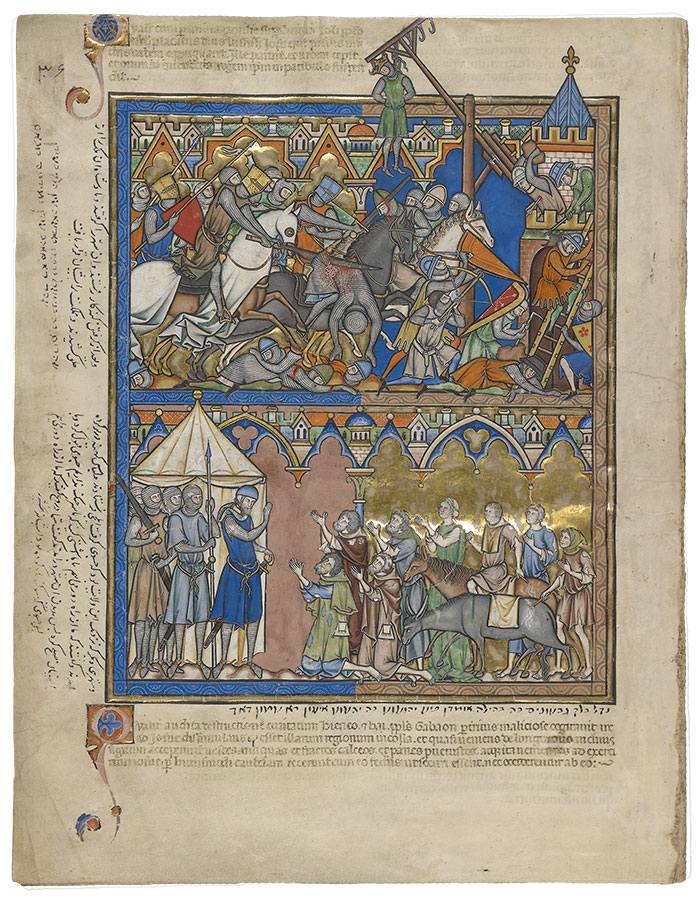MS M.638, fol. 10v

Victory at Ai, A Treaty
Old Testament Miniatures with Latin, Persian, and Judeo-Persian inscriptions
Purchased by J.P. Morgan (1867–1943) in 1916
Victory at Ai
A furious slaughter ensues as Joshua leads the Israelites once more against the city of Ai. Astride a bay horse fitted out with white trappings, Joshua deals a terrible blow with his two-handed glaive (a type of broadsword), splitting an opponent at the waist and spilling his entrails. The despairing defenders flee toward the besieged city, but they are clearly lost: above them, the king of Ai is suspended from a war engine. Meanwhile Israelite foot soldiers attack with crossbows and ladders at the city gate. (Joshua 8:18–29)
A Treaty
The Gibeonites are not eager to meet the same fate as their Amorite neighbors. Posing as vagabonds, they appeal to Joshua for mercy, and he makes a treaty with the Israelites. (Joshua 9: 3–15)
Folio 10v (Latin)
Upper half: How when God, now well disposed toward all the people of Israel after the punishment of one family, had commanded Joshua to set ambushes and attack the city, he obeyed, took the city and having killed all, hanged the king himself on a pole. (Joshua 8: 1–29)
Lower half: How, upon hearing about the destruction of the cities of Jericho and Ai, the people of Gibeon, greatly terrified, perfidiously planned to go to Joshua, concealing the fact that they were the inhabitants of those regions and pretending to be coming from far away. To make it evident they took old clothes and torn shoes and some very old bread, and thus coming to Joshua’s army, they made a treaty, by means of such a pledge, which guaranteed their safety and prevented him from killing them. (Joshua 9: 3–15)
Folio 10v (Persian)
Persian foliation: 36
Upper left margin: After seizing the sinner, they went and conquered that city and hanged the king of that city and the realm became theirs.
Lower left margin: And they sent an ambassador from another city which lay near the realm Joshua had captured; and they came clad in old garments and said, "We have come from far way, make peace with us for we do not intend war." Joshua accepted and made peace with them. And they entered to see the city. He [Joshua] said, "You have lied that you come from far away." But Joshua, who had sworn [to make peace], forgave them.
Folio 10v (Judeo-Persian)
Upper left margin, furthest left: This is a town which the Children of Israel conquered, hanged its king, and became masters of the town. I don’t know where this is.
Lower half, above Latin: This is the tale of the Gibeonites who came with treachery before Joshua so that Joshua would grant them safety.
Italicized words are in Hebrew.
Content consultant: Richard Leson
Persian translated by Sussan Babaie
Judeo-Persian translated by Vera Basch Moreen
Latin translation by Eran Lupu
After the commentary volume accompanying the Fine Art Facsimile edition by Faksimile Verlag Luzern